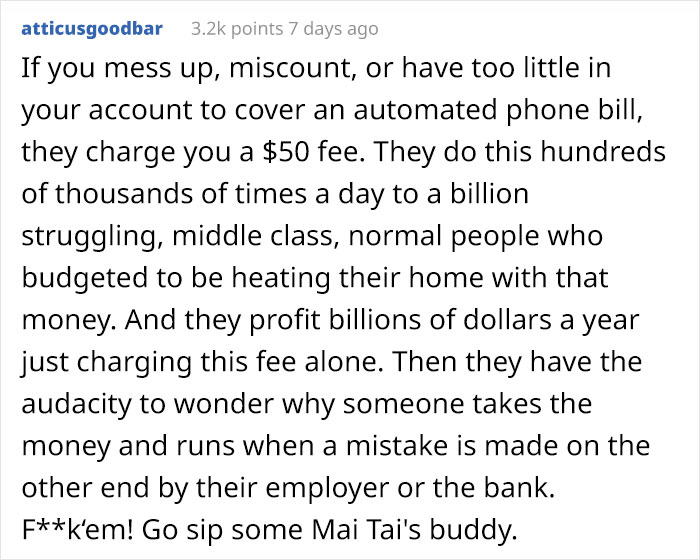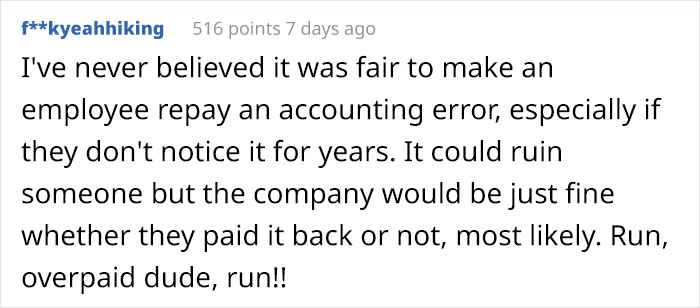
Company’s Blunder Costs Them $180K As The Employee Paid 286 Times His Salary Disappears
Don’t a lot of us dream of winning millions in a lottery, quitting our jobs, and moving away to the Maldives to enjoy the sun, beach, and limitless margaritas? Or traveling around the world, not worrying about the cost of anything any longer? Maybe doing a Jeff Bezos and flying out to explore the orbit?
Point is – the possibilities are endless. But the likelihood of that happening is slim. But what if your job accidentally paid you 286 times more than they should have? What would you do: give it back or keep it and run? This was a debate one Chilean employee had to consider and, to be fair, I commend his choices. Let’s dive into the details, shall we?
A Chilean employee noticed something unusual in his bank balance one day. He was suddenly 165,398,851 pesos richer
Image credits: James Cridland (not the actual photo)
One not-so-regular day in May, an employee was getting ready to head into Consorcio Industrial de Alimentos (Cial), one of the largest producers of cold cuts in Chile, when he noticed something interesting in his bank account.
The man was supposed to receive a sum of 500,000 Chilean pesos ($540.00) as his salary. However, the company accidentally paid him around 165,398,851 pesos ($178,000.00). The amount was 286 times more than he was supposed to get.
Consorcio Industrial de Alimentos (Cial), one of the largest producers of cold cuts in Chile, noticed they’d accidentally paid him 286 times more than usual
Image credits: Alisha Lubben (not the actual photo)
It didn’t take the company long to find a gap of funds when they checked their records. They reached out to the employee, informing him of the error and asking him to return the extra amount. The man allegedly agreed, stating that he’d be going to the bank that day to get it sorted.
However, the money never reached the company. A couple of days later, Cial tried contacting the employee again, but he never answered.
There was no communication for a little while, but then the man called up the company, stating that he was going to the bank soon to refund the money. But instead of funds, on June 2, the company received a resignation letter sent through a lawyer.
The company contacted the man, explaining the error and asking for a return of the funds, to which the man agreed
Image credits: Drew Coffman (not the actual photo)
The man was gone from that point on. He disappeared without a trace. In order to retrieve their money, the company reached out to officials and has taken legal action against the employee, but so far it’s not been fruitful.
Honestly – good on you, mate! Hope you have a fun time while you can. Of course, we do not condone criminal behavior, but as Redditors at the subreddit called ‘r/antiwork’ state, “think this guy is my new hero.” The story was posted there and has since received 43.3k upvotes.
Image credits: Dan Brickley (not the actual photo)
Now, this isn’t the first time something like this has happened. BBC reported on a story in May, where a 24-year-old man gambled away an accidental payment of 46.3M of Japanese yen ($357,400). Like the Chilian, he initially agreed to co-operate with officials, but has since vanished.
The error happened when 463 low-income households were meant to receive 100,000 yen ($770) each as part of a government scheme to ease financial strain caused by the pandemic. But on April 8, all of the funding was accidentally deposited into one man’s bank account.
The man used his smartphone to gamble away all of the money on online casino sites and said, as quoted by his lawyer, “I don’t currently have the money and I don’t have anything with property value at hand. It’s actually difficult to return it.” The Abu Municipal Government is suing the man for 51M yen, including legal fees, but you can’t really sue someone you can’t find.
He assured his employers that he’d be heading to a bank to process the refund, but a few days later, a resignation letter showed up instead
Image credits: mhiguera (not the actual photo)
Mistakes happen and it won’t be the last time this happens. Question is – what should you do in this situation? Unless you’re ready to continue running from the law for the rest of your life, the Advisory, Conciliation and Arbitration Service (ACAS) advises that a negotiated and agreed-upon repayment plan, where the company gets the overpayment back in small increments over time, could be the least strenuous option.
However, if a repayment arrangement cannot be agreed upon, Crunch states that the employer can take the employee to a civil court to recover the money.
In both cases, the judge will consider whether the ‘injustice’ of requiring an employee to repay the money is greater than the ‘injustice’ to the employer of not receiving the overpayment back. They’ll also consider what the employee has done with the money and how much effort was made to report the overpayment.
The man disappeared. The company has reached out to officials and has taken legal action against the employee, but so far it’s not been fruitful
Image credits: Vincent Diamante (not the actual photo)
Of course, the situation will differ depending on the laws of each country and state. According to Wallet Genius, the federal Fair Labor Standards Act (1938) gives companies the legal right to garnish an employee’s wages to reclaim overpayments, but state-level statutes can affect how these standards are implemented.
In some cases, state legislation works in the employee’s favor. In others, it provides the employer with additional protections. Double-check those if you find yourself in this situation.
Image credits: Kurt Stocker (not the actual photo)
But you know what the interesting bit is? We as people are more likely to return a found wallet or large sums of money if we find them randomly.
According to an expansive new study featured by the Smithsonian Magazine, people are more likely to try and return lost wallets with money than those without. In fact, the more money a wallet held, the more likely the subjects were to seek out its owner.
“The evidence suggests that people tend to… have an aversion to seeing themselves as a thief,” Alain Cohn, assistant professor of Information at the University of Michigan, explained. The study’s authors also concluded that “recipients reported a lost wallet partly because they are concerned about the harm they impose on the owner.”
Yet, it can be argued that a company or government body would not suffer the loss of a good sum of money as much as another human being would. Thus, making running away with the funds all the more acceptable. Fun stuff. People are fascinating.
Not the first time a situation like this has happened and it won’t be the last. We hope you, dear reader, never find yourself in a place where you have to choose
Image credits: Benjamin Forrest (not the actual photo)
We hope you, dear reader, never find yourself in a place where you have to choose between running for your life (mayhaps on a yacht in the Pacific ocean) or doing the right thing by returning the money. The decision is not an easy one.
Let us know your thoughts and which side you’d pick yourself. I shall wish you a lovely and prosperous day ahead!
But a Reddit group r/antiwork hailed the man a hero. Let us know your thoughts in the comments below!
29Kviews
Share on FacebookExplore more of these tags
286 times a month salary is more than 23 years of income. Nor wonder he resigned. See you back to work in 2045
Well, when he's caught (if he hasn't left the Country), hope he still has enough to pay his lawyers. Most places count that a Grand Theft/Larceny.
How so? They deposited the money, I’d say it’s a banking error and not his problem.
Load More Replies...286 times a month salary is more than 23 years of income. Nor wonder he resigned. See you back to work in 2045
Well, when he's caught (if he hasn't left the Country), hope he still has enough to pay his lawyers. Most places count that a Grand Theft/Larceny.
How so? They deposited the money, I’d say it’s a banking error and not his problem.
Load More Replies...
 Dark Mode
Dark Mode 

 No fees, cancel anytime
No fees, cancel anytime 

































































64
13